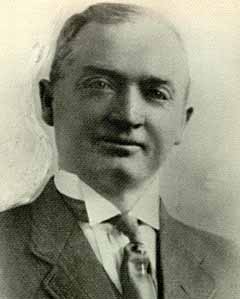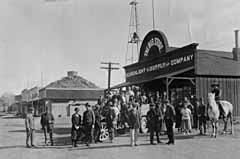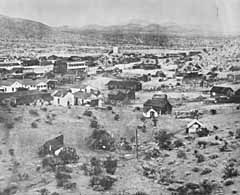George Colton
George Frederick Colton went looking for the Lost Dutchman mine, but instead found his fortune in Searchlight. How he made the discovery and how the town got its name are the stuff of legend and speculation.
Colton was born Nov. 22, 1862, in Provo, Utah, and grew up to marry Matilda Bybee in Brigham City, Utah, in May 1883.
Gale Colton, his granddaughter, says he was on his way from Utah to Arizona in the late 1890s, bound for the Superstition Mountains, where he hoped to locate the legendary Lost Dutchman Mine.
There had been extensive prospecting and mining along the lower Colorado River since the arrival of the Spanish in the 18th century. Most of the activity was centered in Eldorado Canyon, about 20 miles from current-day Searchlight.
In May 1897, Colton located a promising ledge of ore on the top of a hill. A few yards away, he found a second outcropping. Thus, the claim was dubbed the Duplex. Its ore yielded 72 ounces of gold per ton. The Searchlight mining district was created the following year.
Sen. Harry Reid, D-Nev., a Searchlight native and author of the only comprehensive history of his hometown, observed, "The development of Searchlight came at an opportune time in the history of Nevada, since the Comstock Lode was all but exhausted by the time Colton struck gold in 1897. The shipment of ore from the Searchlight District followed a 20-year slump in Nevada mining and gave the state increased visibility nationwide."
As for George Colton, he didn't have much to say about his find. In fact, his family knows very little about him.
Colton was a fiercely independent and close-mouthed man, who tended to his own business and was annoyed with people who tried to mind his.
"When Dun & Bradstreet asked for a report on the Duplex," says Gale Colton, "He said, 'My property is not for sale; I'm not promoting it and not asking for anyone to invest in it, so whatever it's worth is my business and none of yours.' He talked to nobody; he gave no interviews."
When, in 1907, the movement to divide Lincoln County began to gain momentum, George Colton opposed it. Stanton Colton, his great-grandson and former Clark County registrar of voters, thinks it was because the county seat, with its meddlesome officials, was 250 miles away in Pioche, and Colton preferred it that way.
At that time, according to Reid, Searchlight had twice as many registered voters as did Las Vegas, and on that basis was a likely candidate to become the seat of the new county. But by the time the division was accomplished in 1909, Las Vegas had surpassed Searchlight's population. Besides, it was centrally located on the railroad.
George Colton's taciturn nature is the reason for a controversy that seems destined never to die -- how did Searchlight get its peculiar name? He was never interviewed concerning the circumstances of his strike, except to acknowledge that he did, indeed, find gold.
The most widely circulated explanation is that it was named for Searchlight matches, a popular brand used by Colton, who smoked a pipe.
Another tale has it that it was named for a man named Lloyd Searchlight. This story seems to have arisen as a result of some confusion. There is no historical record of any man named Lloyd Searchlight, but there are records of a Lloyd-Searchlight Mining Co.
Yet another story, reported in the town newspaper, The Searchlight, has it that Colton and some other man had spent a particularly grueling and fruitless day combing the area. Returning to camp, Colton is supposed to have thrown his canteen down in disgust and declared, "There is something here, boys, but it would take a searchlight to find it." A few days later, so the story goes, he discovered the outcropping that became the Duplex, and called his new firm the Searchlight Mining Co.
And still another has it that Colton, standing atop the steep hill where the Duplex mine is located, noticed that it commanded a great view, and observed that it would be a perfect place to mount a searchlight.
However, according to family tradition, says Gale Colton, the Searchlight match theory is closest to the truth. She says that when her grandfather came through the area, he had been warned to beware of marauding Indians. Indeed, there had been Indian trouble in the area, and would be again. As he was approaching current-day Searchlight, he saw what he believed was an Indian approaching, and climbed a nearby hill to conceal himself and keep an eye on his potential attacker. As darkness fell, he made camp, but did not risk building a fire. However, he did strike a Searchlight match to light his pipe, and by its faint light, he realized he was sitting on a ledge of ore.
It is impossible to prove any of these theories. The most widely accepted one, according to Reid, is the one about Colton saying it would take a searchlight to find gold. But the family story also is credible, since there was a renegade Indian named Avote who had gone on a rampage shortly before Colton's arrival and killed several men.
Colton's discovery set off a rush to Searchlight, and, between 1907 and 1910, it was one of the more prosperous mining camps in the state. It produced almost $7 million in gold and other precious minerals, and reached a population peak of about 1,500. One of the richer Searchlighters was George Colton, who built a large home on Hobson Street, then the town's main drag. It still stands, one of the few original structures left in town, and still is owned by the Colton family. Unfortunately, says Stanton Colton, scavengers, vandals and the elements have reduced the place to a ruin.
But in his day, G.F. Colton was a leading citizen -- when he was in town.
"They got very wealthy," says Gale Colton, "and they had heavy land holdings in Pasadena, California."
Unlike many pioneers who came to Southern Nevada and were nipped by the "Desert Bug," George Colton does not seem to have embraced the desert aesthetic.
"I don't think he got the bug," says Stanton Colton, "because the whole family seems to have been more in California than in Nevada. They built the mine up and then leased it."
Gale Colton thinks it had to do with the women that the Colton men chose, who tended toward the more sophisticated, socialite types, who preferred the social whirl of Southern California.
George Colton never sought or held public office.
"But he controlled those people who did," says Gale Colton.
As to whether George Colton was a scuffler, in the tradition of so many of his crusty contemporaries, Stanton Colton says he doesn't know of any particular incidents, but suspects that he could handle himself.
"That is," says Stanton Colton, "if he was anything like my father. My dad would go downtown every weekend night and try to find the biggest miner to pick a fight with. And he said that every Friday and Saturday night he would come home with his ass whipped. Shortly after his 16th birthday, he beat the guy. It was his way of showing he had become a man. So I'm assuming that was an inherited trait."
It is certain, though, that George Colton's brother, Will Colton, was every bit the rough and ready frontiersman.
In the winter of 1903, the county fathers in Pioche agreed to provide the town of Searchlight with local law enforcement in the persons of William L. Colton, brother of the town's founder, and Light Wheatly. Reid observes that while there were plenty of crimes and even more personal altercations, they were generally settled one-on-one and rarely were authorities called to intervene. But on one occasion, says Gale Colton, Deputy Colton was called to respond to a raging gun battle which had erupted in a saloon over a game of chance. He waded right into the fray, gun blazing.
"And that ended the fight in a hurry," says Gale Colton.
By 1917, Searchlight's mines were in decline, though they were periodically leased out and mined with some degree of success until about 1953. Most of the Coltons, including George Colton, had moved on to California. Some, like Gale Colton's father, remained. Stanton Colton served for many years as the Clark County registrar of voters, state treasurer and was a candidate for governor.
Searchlight also produced other people who went on to bigger and better things. Edith Head, the famous Hollywood costume designer, was a native, as was William Nellis, a heroic aviator in World War II, for whom Nellis Air Force Base is named. Silent film stars Clara Bow - the "It Girl" - and her husband, cowboy star Rex Bell, though not from Searchlight, had a second home at the Walking Box Ranch west of town. Bell became involved in politics and was subsequently elected lieutenant governor of Nevada.
Unlike the hundreds of other Nevada mining camps which boomed and busted, leaving behind only heaps of rock and holes in the ground, Searchlight survived. It was on the main automobile route between Las Vegas and Los Angeles, the Arrowhead Highway, and managed to hang on by catering to desert-weary travelers. But in 1927, U.S. Highway 91 (now Interstate 15) was completed, bypassing the town. Searchlight hit rock bottom, with a population of only 50.
During the early 1930s, when the Hoover Dam construction was under way, the town enjoyed another boom, owing to the thirst of the nearby construction workers, and an increase in the price of gold, which made the old diggings profitable again. In the 1940s, the town developed a reputation as one of the last outposts of quasi-legal prostitution in the region, when a pimp named Willie Martello opened the El Rey Club. The bordello avoided the anti-prostitution crusade of the late 1950s by burning to the ground.
Unfortunately for historians, George Frederick Colton simply faded away. The family isn't sure exactly when he died. Gale Colton believes that he is buried in Southern California, but isn't certain exactly where.
Today, Searchlight is a popular way station for recreationists traveling to Lake Mohave and Laughlin, and incoming retirees are boosting the population back toward 1907 levels.
George Colton's town seems to have adopted the motto which appears on the Colton coat of arms: "Never Despair."
Part I: The Early Years
Part II: Resort Rising
Part III: A City In Full



















